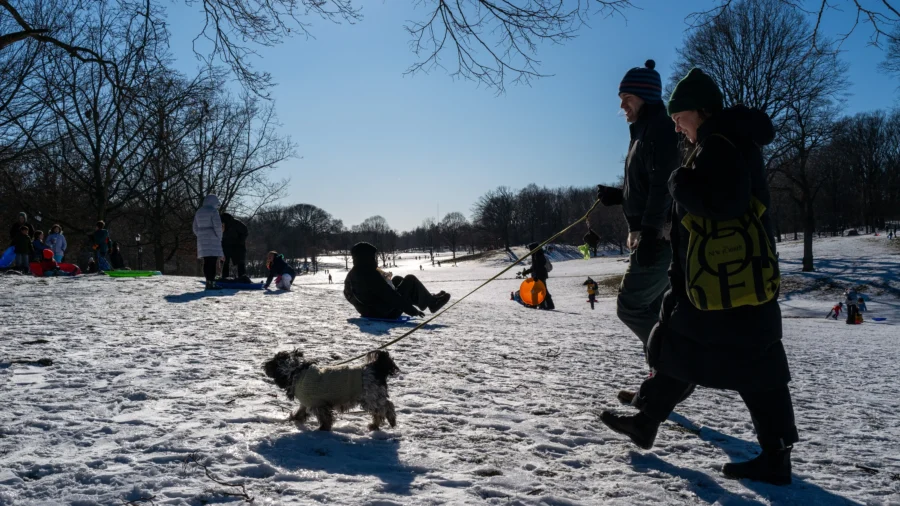Icy conditions are making for hazardous travel as freezing rain pelts large sections of the central U.S. Monday. The freezing rain is being made possible by a large push of milder air slowly starting to overspread much of the winter-weary US.
A barrage of back-to-back winter storms this month have left at least 90 people dead in 13 states as severe conditions have left people crushed under fallen trees, trapped in tornadoes or tangled in snowy car accidents. Tennessee has experienced the brunt of the fatalities, with 34 storm-related deaths.
Now people from the southern Plains to the Great Lakes are seeing accumulating ice and freezing rain Monday. Weather officials and several local transportation departments have warned drivers to exercise caution—or stay off the roads entirely.
“Icy roads will make driving hazardous. Use extra caution and drive slowly!” the Weather Prediction Center said.
Morning commuters in parts of Texas, Oklahoma, and Arkansas discovered slick sidewalks and icy roadways Monday. At least a glaze of ice was reported in each state, according to National Weather Service data.
Even small amounts of ice are enough to cause significant issues on untreated, paved surfaces like roads and sidewalks. Areas that receive greater amounts of ice are more likely to endure tree damage and power outages.
Several school districts across the region have canceled classes Monday, including in Tennessee, Missouri, Arkansas, and Oklahoma.
Meanwhile, parts of eastern Texas and the Lower Mississippi Valley have been showered with rain and thunderstorms as a wave of warm air engulfs the region. Unseasonably warm air will go on to overrun more of the United States as the week progresses.
Ice, Freezing Rain Create Perilous Conditions
Moisture from the Gulf of Mexico began pushing northward over the weekend and into Monday, colliding with the cold air still hovering over parts of the central US to create ice and freezing rain conditions over the Plains and Midwest.
More than 50 million people from Arkansas to the Great Lakes are under winter weather alerts Monday, prompting road hazard warnings in several states.
Ice began to build up on bridges and overpasses in the area Sunday night, the weather service in Tulsa said in a forecast message. The forecasters warned drivers to use “extreme caution” if they have to travel and leave ample distance for stopping.
“Please slow down and use caution as rain may freeze to your vehicle while driving and roads that appear wet may actually be icy!” the Tulsa weather service said in a post.
In Missouri, videos on social media showed cars losing control traveling down an ice-covered hill. Elsewhere in the state, emergency responders literally spun out in any icy development.
Air travel was also hampered by the icy conditions. By Monday afternoon at least 850 flights were canceled in the United States with more than 3,300 delayed. Cancellations jumped early Monday for Chicago’s O’Hare International Airport and the St. Louis Lambert International Airport due to freezing rain in the vicinity of each airport.
In Memphis, Tennessee, cold temperatures caused water mains to break, leaving thousands with their service interrupted over the weekend, Memphis Light, Gas, and Water CEO Doug McGowen said Sunday. Most should have their service restored by Monday, and a boil water advisory could be lifted by Thursday, Mr. McGowen said.
Separate from the early-week ice, brutal winter cold triggered time-sensitive rescues in Vermont. Twenty-three skiers and snowboarders were rescued after getting lost Saturday in the backcountry, according to the Killington Police Department, which deployed a team that “hiked, snowshoed and skinned approximately 5 miles, in frigid temperatures” to guide them to safety.
East Preparing for Dramatic Warm-up
Significantly above-average temperatures will spread across the East by later in the week as a series of fronts and low-pressure systems usher in warmer air and tropical moisture.
After shivering through a frigid weekend, some cities will see daily high temperatures soar by nearly 30 degrees in the coming days.
Daily high temperatures across the region will tick up a few degrees each day through midweek before some of the warmest air arrives Thursday.
Thursday’s highs are set to hit the upper 60s and 70s in the Southeast and the 50s as far north as New York. More than 140 records for warmest daily lows could be broken by Friday in parts of the Southeast, where overnight lows will soar into the 60s.
The significant warm-up will not be confined only to the East. A large swath of the central U.S. will also finally recover from the bone-chilling cold that persisted much of January.
“Temperatures thaw out this week & will stay well above normal through the end of January,” the weather service office in the Twin Cities posted on X, later adding a future of near-record highs “certainly looks possible, stay tuned!”
Though the rush of warm air will shake off the arctic blast that dominated much of the country’s weather through the weekend, it could usher in hazardous rain and flooding.
Rain, Flood Threat on the Horizon
Heavy rain will bring a threat of flooding along the Gulf Coast and western portions of the Southeast until late in the week.
Approximately 37 million people across the affected areas are under threat of flash flooding and excessive rainfall through Thursday morning. As many as 5 to 6 inches of rain could fall by the end of the week, with some areas seeing even more.
Here’s a glimpse of where the heaviest rainfall is expected across the South through throughout the week:
• Monday—eastern Texas, western Louisiana, and southwestern Arkansas
• Tuesday—eastern Texas to Mississippi and southwestern Tennessee
• Wednesday—Texas-Louisiana border to central Tennessee and northern Alabama
• Thursday to Friday morning—Eastern Louisiana, Mississippi and Alabama to the far western corner of North Carolina
Some areas will be under a Level 2 of 4 risk of excessive rainfall for several days in a row.
The-CNN-Wire
™ & © 2024 Cable News Network, Inc., a Warner Bros. Discovery Company. All rights reserved.


